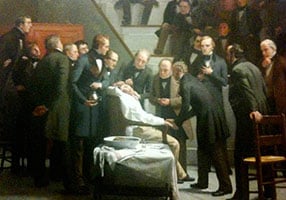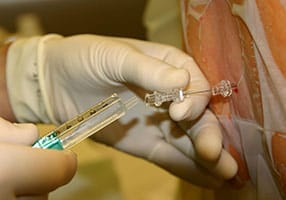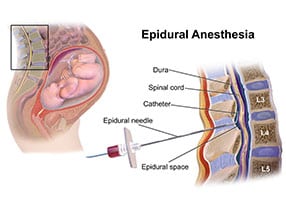What is anesthesia?

Photocredit: musc.libguides.com
Anesthesia is a way to control pain during a surgery or procedure by using medicine called anesthetics.
Anesthesia is used to:
- Relax you.
- Block pain.
- Make you sleepy or forgetful.
- Make you unconscious for your surgery.
Brief history of Anesthesia

Photocredit: iheartliterati.wordpress.com
Anesthesia dates back to the mid-1800s. Before the discovery of anesthesia over a century ago, few surgeries could be performed. Even a condition, which by current standards is easily treated, was usually fatal.
In 1842, Dr. Crawford Long of Georgia used ether to perform the first painless surgery. Dr. Horace Wells demonstrated painless dentistry under nitrous oxide in 1844. In 1846, Dr. William Morton of Massachusetts General Hospital achieved anesthesia with ether.
After World War II ended in 1945, major developments in the field of anesthesiology opened new avenues of medical and surgical care that were previously unthinkable.
What are the types of anesthesia?
LOCAL ANESTHESIA

Photocredit: biologywriteup.blogspot.com
Local anesthesia numbs a small part of the body for minor procedures. For example, you may get a shot of medicine directly into the surgical area to block pain. You may stay awake during the procedure.
REGIONAL ANESTHESIA

Photocredit: en.wikipedia.org
Regional anesthesia blocks pain to a larger part of your body. You may also get medicine to help you relax or sleep.
EPIDURAL AND SPINAL ANESTHESIA

Photocredit : en.wikipedia.org
This is a shot of anesthetic near the spinal cord and the nerves that connect to it. It blocks pain from an entire region of the body, such as the abdomen, hips, or legs.
GENERAL ANESTHESIA

Photocredit : healthydietbase.com
General anesthesia affects your brain and the rest of your body. You may get some anesthetics through a vein (intravenously) and you may breathe in some anesthetics. With general anesthesia, you’re unconscious and you don’t feel pain during the surgery.
What determines the type of anesthesia used?
- Your general health status. This includes other surgeries you have had and the health problems you have. Tell your Anesthetist if you or any family members have had a serious reaction to anesthetics or other medicines.
- The type of surgery. For example, you may need general anesthesia to ensure your comfort and safety during certain types of surgery.
- The results of tests, such as blood tests or an electrocardiogram (ECG).
Your doctor may prefer one type of anesthesia over another for your surgery. In some cases, your doctor may let you choose which type to have. Sometimes, such as in an emergency, you don’t get to choose.
What are the risks and complications of anesthesia?
All anesthesias have some risk, depending on patient’s pre-existing medical condition. For example:
- General anesthesia may induce cardiovascular related problems, sore throat, or vomiting can occur.
- With high doses of local anesthesia, the anesthetic can go into the rest of the body and affect your brain or heart.
- After spinal anesthesia some people get headaches.
Your risk depends on the type of anesthesia you get, your age, your health, and how you respond to the medicines used. Some health problems, such as heart or lung disease, increase your chances of problems from anesthesia. Taking certain medicines, smoking, drinking alcohol, and using illegal drugs can also increase your chance of problems.
Your Anesthetist will talk with you about the best type for you and will review risks, benefits, and other choices.
How can you prepare for anesthesia?
Your Anesthetist will let you know what to do the night before and the day of the procedure. Here are some tips to help you prepare:
- Know when to stop eating and drinking. If you take any medicines regularly, ask your doctor or nurse about changes to your medicine routine for the day before or the day of your surgery.
- Try to stay calm. Many people are nervous before they have anesthesia and surgery. Mental relaxation methods, such as guided imagery or meditation, can help you relax. And some medicines can help you relax.
- Plan ahead for going home. Ask a friend or a family member to drive you home. Don’t plan to drive yourself.
If your child is having surgery or a procedure, you can help him or her prepare. Let your child know what to expect. Be honest if he or she might feel pain. Be sure to tell your child that you will be close by.
What happens while you're under anesthesia and when you recover?
Before and during surgery, an anesthesia specialist will take charge of your comfort and safety. He or she will give you the anesthesia and closely monitor you. This means he or she will check your blood pressure, breathing, heart rate, and other vital body functions throughout the surgery. During surgery, the anesthesia specialist also will continue to give anesthesia to keep you free of pain.
How quickly the anesthesia wears off depends on the anesthetics and other medicines used and on your response to the medicines.
After surgery, you will be taken to the recovery room. A nurse will check your vital signs and any bandages and ask about how much pain you have. If you are in pain, don’t be afraid to say so.
Some effects of anesthesia may last for many hours after surgery.
- You may have some numbness or less feeling in part of your body if you had local or regional anesthesia.
- Your muscle control and coordination may be affected.
- You may have nausea and vomiting. Most of the time, this can be treated and doesn’t last long.
- You may feel cold and may shiver when you first wake up.
For minor surgeries, you may go home the same day. If surgery is more complicated, you may have to move to a hospital room to continue your recovery. If you stay in the hospital, your doctor or nurse will visit you to check on your recovery and answer any questions you have.
Share:
Was this article helpful?
Share:
Was this article helpful?
Health Packages
Elevate your health with tailored health packages at Columbia Asia Hospital. Take charge of your health journey today.
Pink October 2024
From
RM80
Pink October 2025
From
RM80
AIA Policyholders Self-pay Benefits
Columbia Asia 30th Anniversary Promotion “Maternity & Baby”
HLA Policyholders Promo: Influenza Vaccination
RM65
Find Out More12.12 CheckJer Health Package
RM140
Find Out More
